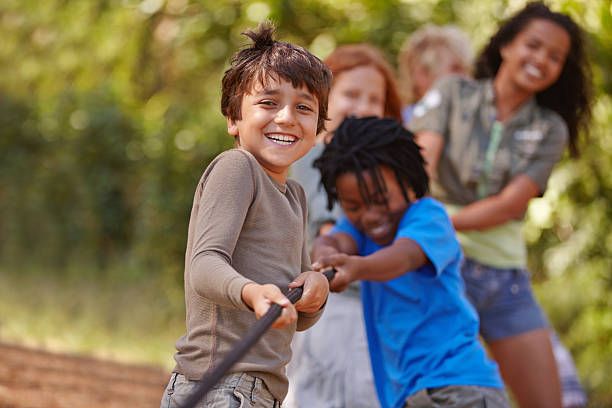At this age, kids prefer to spend an increasing amount of time inside. Most children are glued to the TV, their smartphones, and other gadgets. However, watching cartoons on TV or talking on the phone for extended periods of time can be harmful to their health. Child obesity may also result from couch potatoes. On the other hand, engaging in outdoor games can improve kids’ physical and mental health. Their exposure to nature can also mould and aid in the development of critical social skills. This is a fantastic technique to help children develop their life skills. Parents should be aware of the advantages of enjoying outside games.10 advantages of outdoor game play
Playing outdoor games has several advantages for kids of all ages. Here are a few advantages of playing outside games:
gives them a chance to gain new knowledge
Boost their physical development
improved communication with parents and carers
Help them develop their strengths and social skills
Increased self-awareness aids in personality development.
Utilise your five senses.
improves their motor skills
Create a sense of independence
aid in brain development.
1. Allows kids to experience new learning opportunities through outdoor games
Children’s learning abilities can be greatly enhanced by engaging them in outdoor games and activities. They can gain valuable life lessons and skills, a problem-solving mindset, the ability to explore the natural world, discover new things, and have a basic understanding of science. Additionally, when youngsters organise kid-friendly activities outside of the classroom, they don’t view classroom learning as an ongoing, enjoyable activity.
2. Support their bodily development
Playing outside keeps kids active and might increase their strength and fitness. In addition, playing outside games helps strengthen bones and muscles, enhance immunity, and reduce your risk of developing a number of illnesses, including diabetes, heart disease, obesity, and depression. Being outside and exposed to the sun can naturally produce vitamin D. Children’s vision can be negatively impacted by electronic device use for a longer amount of time. However, playing outside can help them see better.
3. More acceptance of parents and carers
When children are inside, they frequently take care of them in constrained spaces and engage in competition with other kids, such as classmates or siblings. Children, especially younger ones, may find it to be relaxing and terrifying because to its loudness and overwhelming nature. They can choose not to divulge personal information to their carers. Children who play outside tend to feel less overwhelmed since they are not restricted and cannot compete for others’ attention. When a youngster feels as though they have room to move around and breathe, they are frequently more willing to open up and discuss issues with their parent or other adult carer.
4. Assist them in developing social skills
Children who spend time outdoors and play games with one other tend to engage with other children more efficiently than children who stay inside and are alone. If your child spends more time indoors and isolates themselves, it would be ideal if you encouraged them to go outside to play with other kids. Children unknowingly grow and improve their social and communication skills when they make new acquaintances, engage in play, or converse with one another without adult supervision. They may also benefit from this talent in the future.
5. A greater awareness of oneself
Children who play outside likely to gain more important thinking and observational skills. As was already said, children might gain physically from playground games like swinging, but they can also learn to see the world in new ways. They can witness what happens when an adult pushes them, which helps infants learn their environment and the idea of “cause and effect”
6. Promotes personality development advantages of outdoor games for kids
Playing outside shapes a child’s personality. They are autonomous and self-sufficient. Additionally, they learn how to manage crises, reversals, etc. without adult supervision. This gives them self-assurance and prepares them for later life’s challenges. External play also aids in the development of discipline, athleticism, and leadership skills that will be useful later in life.
7. Employ your five senses
The only senses used by preschoolers who watch a lot of television are sight and hearing. When they mature, this could actually hinder their capacity to process and react to sensory stimuli. On the other hand, children who play outside employ all of their senses as they explore the outdoors—possibly even tasting as they speak about snowflakes or showers. As they grow and develop, this helps young children become accustomed to a variety of sensory experiences so that they can process them more efficiently.
8. Improves their motor skills
Children with excellent motor abilities, such as coordination, balance, and agility, outperform their indoor classmates, according to research on the subject of outdoor play. Children who play outside are more likely to love riding, jogging, and walking. When kids are outside, they have room to run, walk, leap, jump, and toss. They can also hop over shrubs and ride bicycles to develop their fine motor abilities. By allowing children to challenge and push their physical limits, they strengthen their bodies and gain self-assurance in their motions. Whatever their demand for the sports they learn, extended outside time can give kids and athletes the chance and the space to practise sports like batting, kicking and catching.
9. Foster a sense of independence
It was shown that letting kids play outside helps them develop a sense of independence. Children typically feel free while they are in the park and don’t feel so anywhere else, despite the fact that a parent is frequently nearby. They have the freedom to explore and take small risks without having adults hovering over them. Together with their pals, they can create new games, discover their capabilities, and test their boundaries. They will continue to study and develop as a result of the resulting confidence.
10. Outdoor games that promote brain development
Children who play outside create games, discover their surroundings, and develop a sense of independence. By creating games, solving problems, and putting their thoughts and answers into action, they enhance their organisational capabilities and decision-making abilities in addition to these independent attitudes. They collaborate with their peers and work alone. While playing, kids also discover how crucial it is to establish and abide by rules.
Conclusion
If you make outside play more enjoyable for kids, it may inspire them to participate in outdoor sports and games. To encourage your child to explore and play in new ways with their favourite toys, try to gather them up outside. Examples include modelling clay, cars, a ball, and other toys. Children can use their senses to experience the outdoors while playing outdoor games. The advantage of outdoor play is that it enhances a child’s concentration, observational skills, and gross motor abilities in a natural setting. Make sure to explain the advantages of playing outdoor games to children.

